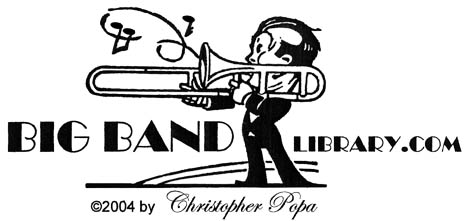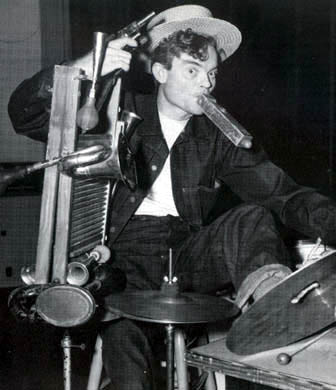
Although Jones said he decided to do musical satire after classical composer Igor Stravinsky wore a pair of squeaky shoes while conducting an orchestra, the first bit of inspiration apparently came when Jones was a boy.
According to his biographer, Jack Mirtle, a chef piqued young Jones' interest when he rattled knives, forks, and other utensils in interesting rhythms.
Initially, Jones became a top studio drummer and percussionist, playing on such recordings as Zing! Went the Strings of My Heart by Judy Garland [ Decca, 1939 ], (I Ain't Hep to That Step But I'll) Dig It - Fred Astaire [ Columbia, 1940 ], and My Time Is Your Time - Rudy Vallee
[ Victor, 1942 ].
vital stats:
given name Lindley Armstrong Jones
birth Dec. 14, 1911, Long Beach, CA
death May 1, 1965, Beverly Hills, CA
physical description blue eyed, sandy-haired, 5'10-1/2," 141 lbs.
father Lindley Murray Jones, a railway depot agent, b.1868?, d.1948
mother Ada (Armstrong) Jones, a school teacher
education graduate, Long Beach Polytechnic High School, Long Beach, CA, June 1929;
Chaffey Junior College, Ontario, CA
first wife Patricia Middleton, m.Sept. 7, 1935, div.Oct. 1946
daughter Linda Lee Jones, b.Oct. 23, 1939
second wife Helen Constance Greco ("Helen Grayco"), b.1925?, m.Jul. 18, 1948, a singer
son Lindley Armstrong Jones, Jr. ("Spike Jr."), b.May 19, 1949
daughter Leslie Ann Jones, b.June 13, 1951
daughter Gina Marie Jones, b.Jul. 14, 1958
memberships Local 353, American Federation of Musicians, Long Beach, CA; Local 47,
American Federation of Musicians, Los Angeles, CA
As he gradually organized his own band, which became known as his City Slickers, Jones' send-ups of songs had to be heard to be believed!
They were signed to Bluebird Records in 1941, then switched to its parent label, Victor, in 1944. Among their popular discs were Clink, Clink, Another Drink, with a vocal by Del Porter and the Boys in the Back Room, hiccups by Mel Blanc; Der Fuehrer's Face, sung by Carl Grayson and the Boys in the Back Room, with Willie Spicer at the Birdaphone; Cocktails for Two, another Grayson vocal; Chloe, with Red Ingle asking, "Where are ya, you old bat?"; the William Tell Overture, featuring Doodles Weaver's commentary on the racehorse Feetlebaum; All I Want for Christmas (Is My Two Front Teeth) with trumpeter George Rock's baby voice; and Knock Knock (Who's There?) with the cast of Weaver, Sir Frederick Gas, Rock, Freddy Morgan, Dick Morgan, and the Four Fifths.
Jones and his associates replaced musical notes with off-the-wall noises, from belches, hiccups, and sneezes to glugs, coughs, and wheezes.
Other sounds used for comic effect included auto horns, gunshots, "sputs" (fast passage of air through the mouth), bird calls, chicken clucks, a dog barking, a tuba, a washboard, cowbells, a slide whistle, kazoos, and a fire siren.
At any given moment, there could be heard a "latrinophone" (which is a toilet seat strung with catgut), a "crashophone" (bags of metal balls dropped into a metal washtub, in order to make the sound of breaking glass), or an octet of Flit guns tuned to E flat.
Other Spike Jones Take-Offs on Songs or People - select list
Henry Morgenthau, U.S. Secretary of the Treasury = Henry Morgenthau Blues
lawman-gunfighter Wild Bill Hickok = Wild Bild Hiccup
Sleepy Lagoon = Drip, Drip, Drip (Sloppy Lagoon)
Jeanie with the Light Brown Hair = I Dream of Brownie with the Light Blue Jeans
I'm Forever Blowing Bubbles = I'm Forever Blowing Bubble Gum
Sons of the Pioneers vocal group = "Sons of the Sons of the Backwoodsmen"
Mule Train with a vocal by "Fleddy Morgan"
Tennessee Waltz - vocal Sara Berner, assisted by Sir Frederick Gas
singer Eddie Fisher = I Want Eddie Fisher for Christmas
Artie Shaw = "Artie Shroud"
Vaughn Monroe = "Embalm Monroe"
Meanwhile, Jones' live appearances, which took him and his City Slickers across the country to theaters, auditoriums, and arenas, involved a huge number of props - a sampling of which might include axes, a frying pan, wigs, a hammer, gongs, assorted whistles, a telephone, a seltzer bottle, and a silk "bang" flag.
In order to pull everything off with the necessary split-second timing, Jones employed very talented and versatile musicians.
Besides the personnel mentioned earlier, members of the City Slickers also included clarinetist Mickey Katz (father of musical theatre star Joel Gray); comic little person Billy Barty (who, seated at a miniature piano, would imitate Liberace and sing I'm in the Mood for Love); and Purves Pullen (as "Dr. Horatio Q. Birdbath").
Jones' final recording at RCA, done on February 15, 1955, was This Song Is for the Birds, sung by Clara Cackle, Dr. Birdbath and Sam Quentin and his Quails.
Spike Jones - In his Own Words:
". . . I like playing this way because it pays good dough. That's all I'm in this racket for and when it
stops paying dividends, I'll do something else . . ."
". . . Nobody knows what makes a pop tune. Take Pistol Packing Mama which is now right up there.
There's no reason for it. None that I can see. But there it is . . ."
For the last decade of his life, Jones, a chronic chain smoker and always a thin man, suffered from emphysema and respiratory trouble.
Yet he continued to work, appearing often on television, performing in-person, and recording for Verve or Warner Brothers, or, from 1960-on, Liberty.
Of course, he always tried to stay topical and find new successes.
So when the popular songs of the day no longer lent themselves to being lampooned ("How can I wreck something that's already been ruined in its original version," Jones quipped), he presented new material with humorous titles, including Wyatt Earp Makes Me Burp, Madame Fifi's Can-Can, and Pimples and Braces.
In January 1965, Jones collapsed from an asthma attack at a hotel in El Cajon, CA and died in his sleep a few months later.
Since then, others, including his son, Spike Jr., have briefly tried to carry on, if not with the same material, then in a similar, free-wheeling fashion.
"We have to be very careful because of my name. A lot of people really are into this nostalgia thing and they come expecting to see an hour of old material," Spike Jr. explained in 1975. "There was a good deal of immediacy in the old Spike Jones act, and we've worked hard to get that same feeling."
But, cue the bronx cheer. To paraphrase an old saying, "perhaps imitated, never duplicated."
Today, Jones' recordings, which are his legacy, still bring a smile, so, as he would acknowledge with mock solemnity to his audience, "Thank you, music lovers."
sources:
Richard Corliss, "Music: Spike up the Band: Fifty years after he demolished pop hits by
orchestrating them for tubas, kazoos and pie pans, Spike Jones is again the rage,"
Time, June 13, 1994.
Jack Mirtle, Thank You Music Lovers: A Bio-discography of Spike Jones and His City
Slickers, 1941 to 1965 (Westport, CT: Greenwood Press, 1986).
Social Security Death Index.
"Spike Jones Dies; Creator of Zany Music: Rose to Fame in '40s with City Slickers,"
Chicago Tribune, May 2, 1965, p.F54.
Bruce Vilanch, "People: Junior Spikes up the band," Chicago Tribune, May 16, 1975, p.B5.
John S. Wilson, "Nostalgia: The fweet is back," [ Cleveland, OH ] Plain Dealer, Jan. 23,
1987, p.18.
Jordan R. Young, Spike Jones and His City Slickers: An Illustrated Biography (Beverly
Hills, CA: Disharmony Books, 1984).
---, Spike Jones Off the Record: The Man Who Murdered Music (Beverly Hills, CA:
Past Times Publishing Co., 1994).
I would like to expand this tribute with, if possible, a new interview of someone who was important to Spike Jones' life or career. Are you an alumnus of his band, a member of his family, or a collector who is knowledgeable about his accomplishments? Please contact me via e-mail
return to "Biographical Sketches" directory
go to Big Band Library homepage
The big bands are back
in a new and exciting way!
SPIKE JONES
"THANK YOU, MUSIC LOVERS"
by Music Librarian CHRISTOPHER POPA
July 2009
He once described himself as "dandruff in the long hair of music."
DownBeat magazine called him the "King of Corn" for many years.
Others said he was "a back-alley Beethoven," "a musical assassin," or, simply, "hilarious."
His shows were dubbed "Musical Madness," the "Musical Depreciation Revue," and "Spike-taculars."
Jones' work became an influence on such entertainers and future musical iconoclasts as Stan Freberg, Ernie Kovacs, Tom Lehrer, Frank Zappa, and, more recently, Weird Al Yankovic.
